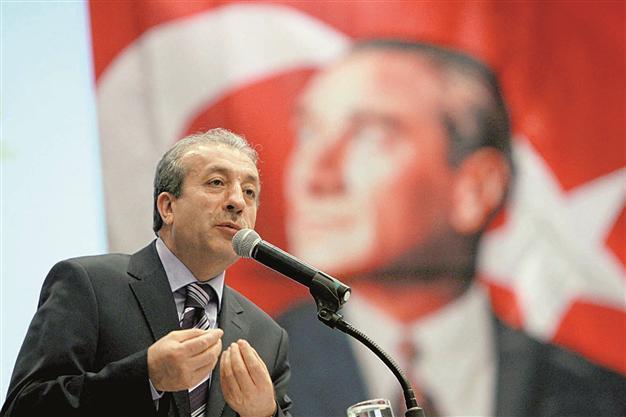Who will stay and who will leave at the AKP?
ANKARA - Hürriyet Daily News

Agriculture Minister Eker will not be able to run for office in the next elections.
Prime Minister Recep Tayyip Erdoğan said in Astana that during the Justice and Development Party’s (AKP) congress in the fall, the Central Decision Executive Body (MKYK) and Central Executive Board (MYK) would change.
“It would be beneficial if those who are not restricted by the three-term ban were to take places in the party administration,” he said.
According to the AKP’s statute, deputies who have been elected for three consecutive terms cannot run for office the next term. Erdoğan has emphasized that the new “front desk” will carry the party to the local and general elections. This also shows that Erdoğan will have to make radical changes during the congress. I have the impression that the structure of the Cabinet, which has not undergone a significant change for more than 10 years, and the Parliament staff will also be renewed. Erdoğan seems to prefer to shift those influential Cabinet ministers and deputies who have served three consecutive terms out to local administrations.
Erdoğan, who himself also faces the three-term ban, will either ascend to the Presidential Mansion at Çankaya or, if the system changes, run to become a “president.” Erdoğan will be redesigning almost the entire staff of the party at the fall congress. This will not be an easy task at all, because the 73 deputies who face the three-term ban are absolutely the spine of the party.
Parliament Speaker Cemil Çiçek, former Parliament Speakers Köksal Toptan and Mehmet Ali Şahin, Deputy Prime Ministers Bülent Arınç, Ali Babacan, Beşir Atalay and Bekir Bozdağ, and ministers Faruk Çelik, Mehdi Eker, Sadullah Ergin, Egemen Bağış, Hayati Yazıcı, Taner Yıldız, Nihat Ergün, Fatma Şahin, Binali Yıldırım, Recep Akdağ, and Suat Kılıç as well as the person who is in all the headlines these days, Interior Minister İdris Naim Şahin, will not be able to run for office in general elections. Given Erdoğan’s statement, these people will not be given seats at the “front desk” of the party, either.
In the current party administration, there are some who have past their three terms: deputy chairmen Hüseyin Çelik, Ömer Çelik, Abdülkadir Aksu, as wells as deputy group chairmen Nurettin Canikli and Mustafa Elitaş, will not be able to run again.
There are only a handful of prominent names who are not restricted by the ban.
It is also being whispered that Erdoğan will call on some external names who are successful in their own fields to assist the party and give them seats in the MKYK. Many deputies and some ministers still voice the concern that the three-term ban will “put the AKP in trouble in the future.”
Despite that, Erdoğan seems determined to make a major renewal in the AKP, the party he created from scratch, after 10 years, and proceed accordingly.
Complaint might emerge at Uludere
The Parliamentary Human Rights Commission has started writing its report on Uludere. The content of the report will be shared with the public next week, and there might be “criminal complaints” for “surprise” names. The commission has reached interesting details. The time of the arrival of the smugglers killed at Uludere is around 5 p.m. At the same time, the National Security Council (MGK) meeting was occurring. The analysis of Heron images took until 7 p.m. There is no special note about the incident submitted to the MGK where the president, prime minister, Cabinet ministers, the chief of the General Staff and force commanders were present.
Those members of the commission from the ruling Justice and Development Party (AKP) have reached the conclusion that the decision was not made at a brigadier general level. They believe that Brig. Gen. Ali Rıza Kuğu or retired Brig. Gen. Salim Cüneyt Kavuncu might have analyzed the images, but they believe the order to “strike” must have come from a higher level.
As far as I know, the report is being written according to this framework. Unless there is a last-minute change in the report, there might be a demand for a “criminal complaint” in the report for levels such as “army commander,” or even “force commander” on charges of “neglecting duties.”
Main opposition CHP’s new constitution pain
The “ultranationalist” wing of the main opposition Republican People’s Party (CHP), which has been growling for some time behind closed doors about the writing of the new constitution, took the stage last week. In a closed-door meeting of the CHP’s parliamentary group, deputies Dilek Akagündüz, Tanju Özcan and Mahmut Tanal took the floor and harshly criticized the commission members. Their criticisms were essentially, “Let us not be tools in the writing of a government-directed constitution. Let’s determine our red lines and first and foremost handle these. If that does not happen, then we should be discussing leaving the table. We are still insisting on staying at the table at a point where the prime minister has said, ‘if not, we can pass it with a bilateral agreement.’” The new constitution pain in the CHP is increasing. There are also contradictory voices from the grassroots. This disturbance might be a headache for leader Kemal Kılıçdaroğlu at the congress at the beginning of July.
